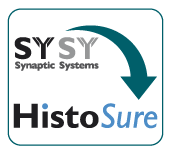|
|
|
|
| Cat. No. HS-487 017 |
100 µg purified IgG, lyophilized. Albumin and azide were added for stabilization. For reconstitution add 100 µl H2O to get a 1mg/ml solution in PBS. Then aliquot and store at -20°C to -80°C until use. Antibodies should be stored at +4°C when still lyophilized. Do not freeze! |
| Applications |
IP: not tested yet ICC: not tested yet IHC: not recommended IHC-P: 1 : 100 (see remarks) gallery |
| Clone | SY-87E12 |
| Subtype | IgG2a (κ light chain) |
| Immunogen | Synthetic peptide corresponding to residues surrounding AA 470 of mouse T-bet (UniProt Id: Q9JKD8) |
| Reactivity |
Reacts with: mouse (Q9JKD8). No signal: human (Q9UL17). Other species not tested yet. |
| Remarks |
IHC-P: Antigen retrieval in pressure cooker is recommended. The antibody shows some unspecific staining in mouse cerebellum. |
| Data sheet | hs-487_017.pdf |
 Important information
Important information|
|
T-bet (also known as Tbx21) belongs to the T-box subfamily Tbr1, and is an important transcription factor for the immune system. T-bet is a potent transactivator of the IFNγ gene and its expression correlates with IFNγ expression in Th1 cells, NK cells, and B cells (1). In CD4 T cells, Th1 and Th2 lineage commitment is regulated by opposing actions of T-bet and GATA-3 (2). T-bet promotes CD4 Th1 differentiation and represses alternative cell fates like Th2, or Th17, whereas GATA-3 is the lineage determining transcription factor for Th2 cells (2). CD8+ T cells require T-bet expression to differentiate into effector cells (3). In NK cells, T-bet expression is required for NK cell maturation (4).